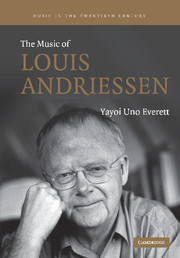Book contents
- Frontmatter
- Contents
- List of music examples and figures
- Acknowledgements
- List of abbreviations
- Introduction
- 1 Dutch music in the twentieth century
- 2 Formative years
- 3 Politics and “concept” works
- 4 Toward the metaphysical in art (1981–88)
- 5 Ramifications
- 6 Operatic collaboration with Peter Greenaway
- 7 Contemplative works
- 8 Epilogue
- Bibliography
- Index
Introduction
Published online by Cambridge University Press: 22 September 2009
- Frontmatter
- Contents
- List of music examples and figures
- Acknowledgements
- List of abbreviations
- Introduction
- 1 Dutch music in the twentieth century
- 2 Formative years
- 3 Politics and “concept” works
- 4 Toward the metaphysical in art (1981–88)
- 5 Ramifications
- 6 Operatic collaboration with Peter Greenaway
- 7 Contemplative works
- 8 Epilogue
- Bibliography
- Index
Summary
On a hazy July morning in North Adams, Massachusetts, I walked into the third floor of MASS MOCA, where a group of young students had gathered to rehearse Louis Andriessen's Workers Union (1975) at full intensity. The relentless rhythm of the band, consisting of vibraphone, brake drums, electric guitar, violins, piccolo, piano, and kazoo, resonated through the brick walls of the museum complex, a converted factory that houses the Bang on a Can Summer Music Institute. Andriessen walked into the rehearsal space, paid compliments to the musicians, and greeted the guitarist Mark Stewart, who leads the group. Following a casual introduction, he told the group: “The piece should sound difficult. You make it sound too easy – this isn't Cuban jazz!” Jolted by his comment, the students – many of whom were not acquainted with Marxist ideology and the social context in which the piece was composed – tried to give a harsher edge to the sound of relentless rhythms played in unison. Three days later, Workers Union was showcased along with post-minimalist works by David Lang, Julia Wolfe, Michael Gordon, and Steve Reich in a six-hour marathon concert. The boisterous energy and response from the audience generated an atmosphere of a pop or rock concert more than that of a typical contemporary music event.
As a radical anarchist turned “guru,” Andriessen has influenced a host of young composers and musicians through his residencies at the California Institute for the Arts (1983), Yale University (1986), Duke University (1991), Princeton University (1996), and other institutions in the United States.
- Type
- Chapter
- Information
- The Music of Louis Andriessen , pp. 1 - 11Publisher: Cambridge University PressPrint publication year: 2007
- 1
- Cited by

